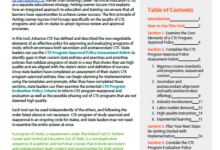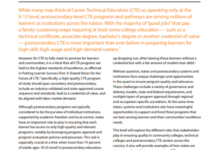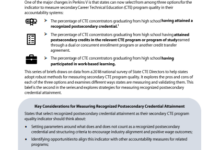The Board of the Wisconsin Technical College System (WTCS) has statutory authority for the “initiation, development, maintenance and supervision of programs with specific occupational orientation below the baccalaureate level.” Using this authority, the system operates a two-phase approval process for all technical college programs.
When a college wants to launch a new program, it must start by obtaining “concept approval” from the system. This process begins with the college demonstrating local need for this new program, which it does through a few different mechanisms. First, the college must submit to the system an analysis of labor market data from a state-approved source that shows the need for this new program in the state. The college must also engage with other colleges that offer similar programs and gather information on the outcomes of those existing programs, recruitment or retention challenges, expenses, and any barriers posed by accreditation or other regulations. This step is when the college must obtain local board approval. During these conversations, the college works with system staff to develop a tentative program title and description, including course codes and completion requirements. This first phase is also when the college begins to assemble its industry advisory committee and gain commitments for industry support. Employers are involved in the process from the beginning, and advisory committees are required to meet at least three times a year throughout the lifetime of the program to provide input on program structure and curriculum.
Once these steps have been completed, the college will submit relevant materials to the system office for a review. System staff may follow up with the college to ask for clarification or more information before the application is submitted to the State Board for review. Once materials are submitted to the WTCS office, this first phase of program approval may take about one and a half to two months.
Once the State Board approves the concept, the college submits the program for approval. In this phase, the college takes about one month to decide on the curriculum for the program, explore the potential for integration into other career pathways, and answer any questions raised by the State Board during concept approval. Once again, materials are submitted to WTCS staff, who take around 45 days to review the materials; ask for clarification and more information; and decide to submit to the State Board, which can then ask further questions, suggest modifications, and potentially approve the program for implementation.
For a program to be discontinued, it must have been suspended for one year and have no learners currently enrolled. All program suspensions and discontinuances are reviewed and approved by the WTCS Board. Additionally, if local administrators modify more than 20 percent of an existing program during a single academic year, including adding and deleting courses, changing course numbers or changing credit hours, the WTCS education director is required to review the changes and approve them to ensure that the changes maintain the quality and relevance of the program.
Policy in Action
While colleges can take more time to conduct more thorough revisions to program structure and curriculum, WTCS sets a stop date for program consideration to ensure that programs are developed in a timely manner. In 2017, WTCS approved 27 new associate degree programs, 28 technical diploma programs, and one new apprenticeship program, distributed across all of the Career Clusters®. Notably, WTCS also suspended 27 other programs in 2017 based on program outcomes and/or labor market justification. A suspension, generally requested by college staff, lasts between one and three years and provides the college with time to either close the program or modify its scope and/or content to increase relevance and quality, at which point it can be reactivated. Students who are currently enrolled in programs that have been suspended are counseled on their options for enrolling in another program at the college or finding other ways to complete the program using the credits they have already earned.
Related Links:
Resource: Driving Quality in Postsecondary CTE: Approval and Evaluation Policies
Statute: WIS.STAT 38.001 (1m)




